八年级上册英语导学案
人教版八年级英语上册导学案(全册)

全册导学案Unit 1 Where did you go on vacation?Section A 1a—1c内容:unit1 Where did you go on vacation? 课时:1课时英语组编写人:审核人:审批人;【学习目标】1、学会谈论过去发生的事件—学习一般过去时的用法2、掌握规则动词的变换规则3、熟记一些常用的不规则动词【学习重点、难点】1.复习一般过去时态的构成及用法;2.进一步学习一般过去时态针对地点的提问及回答;【学法指导】1、能向小组成员用英语介绍生活中的日常活动,如:stay at home , go to the beach, do my home work,watch TV, visit my uncle, go to New York, etc.2、运用一般过去时谈论过去的一天或一次旅行。
3.不规则动词过去式的归类记忆【教学过程】一、导入(启发探究 3分钟)StepA、试一试你能写出下列各词的过去式吗?stay_________ do_________ stop_________play_________is_________ go_______ buy_______ have _______like_________ visit_________ are_________ carry_________StepB、快乐译一译stay at home_________ go to summer camp_________go to New York city______ go to the mountains_________visit my uncle_________ go to the beach_________visit museums _______Step C、考考你的迁移能力1. Lucy usually______to school early. But today she ______to school late. (go)2一What___________you__________(do) on your vacation last year?--–We___________(play) on the beach.3.I______ (call) you just now. But there_______ (be) no answer.4.Where __________you(study) at home las night? 一No, I__________(help)my mother__________(clean) the room.5. The students of Class One go to see the old woman __________ (one) a month.Step D、answer the questions:How was your summer vacation ?Where did you go on vacation?Who did you go there with ?What did you do there ?二、自学(自主探究 6分钟)Step 1c师生、生生操练Where did you go on vacation? I went to New York City.Did you go out with anyone? No, No one was here. Everyone was on vacation. Did you buy anything special? Yes, I bought something for my father. How was the food? Everything tasted really good.Did everyone have a good time? Oh,yes. Everything was excellent. 三、交流(合作探究 10分钟)Step 1a Reciting1.Read the phrases and know their meanings.stay at home_________ go to summer camp_________go to New York city______ go to the mountains_________visit my uncle_________ go to the beach_________visit museums _______2.finish the task:match the activities with the pictures.3.check the answers.4. students read and remember the phrases.Step 1b Listening1.students read the names.2. students guess their activities.3. finish the task:4. check the answers.5. students read and know the mmeaning of this passage.四、总结(引深探究 15分钟)I、语法:一般过去时态的运用1.带有确定的过去时间状语时,要用过去时如:two days ago…、last yearin the old days just nowwhen I was 8 years old yesterdayDid you have a party yesterday?2 表示过去连续发生的动作时,要用过去时这种情况下,往往没有表示过去的时间状语,而通过上下文来表示。
教科版八年级上册英语导学案(定稿)

教科版八年级上册英语导学案(定稿)一、课前准备- 复上一节课的内容,确保掌握。
- 准备相关研究材料,如课本、笔记本等。
二、课堂导入- 利用图片或视频激发学生对本课主题的兴趣。
- 向学生提出启发性问题,让他们思考和回答。
三、研究活动1. 模块一:Listening- 导入相关听力材料,例如录音或视频片段。
- 学生在听材料的过程中,预测可能会出现的问题和关键词。
- 听完材料后,进行听力理解训练,包括回答问题、填空等。
2. 模块二:Speaking- 鼓励学生进行口语交流。
可以通过小组讨论、角色扮演等方式实现。
- 提供话题和问题,引导学生展开自由对话。
3. 模块三:Reading- 引导学生阅读课文或相关阅读材料。
- 学生可以先快速浏览内容,获取整体理解。
- 进行详细阅读,抓取关键信息,回答问题或进行其他形式的阅读理解训练。
4. 模块四:Writing- 引导学生进行写作训练,如写作文章、写作对话等。
- 提供写作指导和范文,让学生进行写作实践。
四、课堂总结- 对本节课的重点内容进行归纳总结。
- 与学生一起回顾研究目标,确保理解和掌握。
- 鼓励学生提出问题和疑惑,解答他们的疑问。
五、课后作业- 布置适当的作业,巩固学生的研究成果。
- 可以包括课后练题、写作任务等。
六、教学反思与改进- 对本节课的教学进行反思,总结教学经验。
- 根据学生的反馈和表现,进行适当的教学改进。
以上是教科版八年级上册英语导学案的编写建议,根据具体内容和教学需要,可以进行适当的调整和修改。
部编RJ人教版PEP 初二八年级英语 上册第一学期秋季(优质导学案)Unit 1 导学案
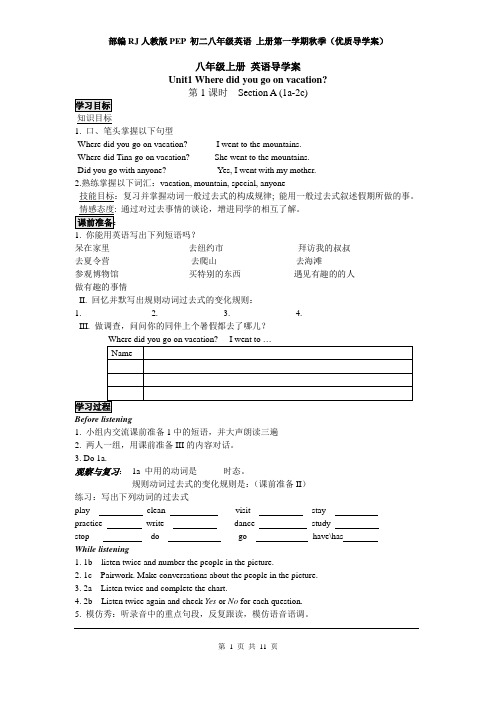
八年级上册英语导学案Unit1 Where did you go on vacation?第1课时Section A (1a-2c)知识目标1. 口、笔头掌握以下句型-Where did you go on vacation? -I went to the mountains.-Where did Tina go on vacation? -She went to the mountains.-Did you go with anyone? -Yes, I went with my mother.2.熟练掌握以下词汇:vacation, mountain, special, anyone技能目标:复习并掌握动词一般过去式的构成规律; 能用一般过去式叙述假期所做的事。
通过对过去事情的谈论,增进同学的相互了解。
1. 你能用英语写出下列短语吗?呆在家里_________ 去纽约市_________ 拜访我的叔叔_________去夏令营_________ 去爬山_________ 去海滩_________参观博物馆_________ 买特别的东西_________ 遇见有趣的的人_________做有趣的事情_________II. 回忆并默写出规则动词过去式的变化规则:1.______________2. ______________3. ______________4. ______________III. 做调查,问问你的同伴上个暑假都去了哪儿?Before listening1. 小组内交流课前准备1中的短语,并大声朗读三遍2. 两人一组,用课前准备III的内容对话。
3. Do 1a.观察与复习:1a 中用的动词是______时态。
规则动词过去式的变化规则是:(课前准备II)______________________ 练习:写出下列动词的过去式While listening1. 1b listen twice and number the people in the picture.2. 1c Pairwork. Make conversations about the people in the picture.3. 2a Listen twice and complete the chart.4. 2b Listen twice again and check Yes or No for each question.5. 模仿秀:听录音中的重点句段,反复跟读,模仿语音语调。
八年级英语上册导学案-Unit 1 Where did you go on vacation

Unit 1 Where did you go on vacation? 导学案Section A 1a—2c第1课时【学习目标】:1. Talk about past events2. To learn to use where questions and answers【学习重点】:学会用一般过去时态描述曾经度过的假日。
【学习过程】:1. 知识链接:1). 复习一般过去时态的意义与结构。
2). 掌握一些规则的和不规则动词的过去式。
2. 自主学习(教师寄语:Many hands make light work. )1) 要求学生小组讨论自己刚刚过去的暑假。
并写下用到的句型:____________________________________________________________________________ ____________________________________________________________________________ _______________________________2) 利用素材练习以上句型。
3)认读短语并将单词与图画匹配.4)小组活动Example: A: Where did Tina go on vacation?B: She went to the mountains.3. 听力练习1)Listen. Where did the people go on vacation? Complete the chart.People PlacesGraceKevinJulie2)Listen again. Check(√)Yes, I did or (×)No, I didn't for each question.4. 巩固练习According to the listening, and role-play the conversations between Grace, Kevin and Julie.Example: A: Grace, where did you go on vacation?B: I went to New York City.A: Oh, really? Did you go with anyone?B: Yes, I went with my mother.课后作业Show us your vacation. Whose vacation is the best(最棒)?【学习小结】(教师寄语:No man can do two things at once.)1. 总结一下本课时学到的动词短语。
人教版八年级英语上册导学案(全册)
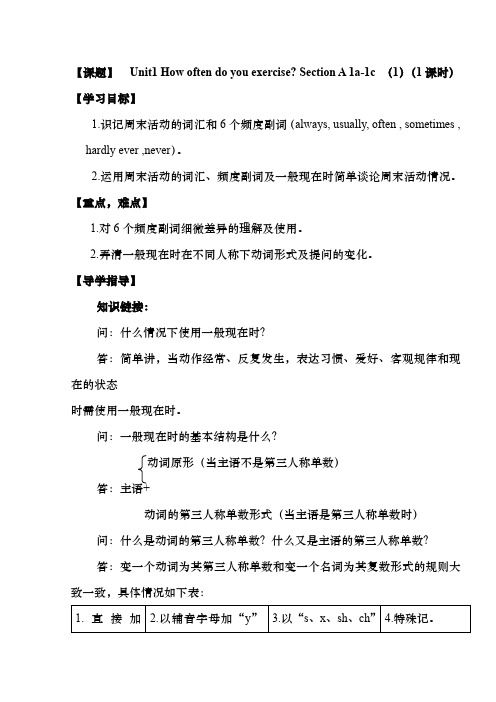
always从不,决不★
often几乎不☆(no star)
2.小组交流学习成果并讨论下列按频率高低顺序排列的表达是否正确(正确写T,错误写F)?若不正确,给出正确表达。
always>often>usually>sometimes>hardly ever>never.____
______>______>_____>______>_______>____.
5.Pair Work Show(展示对话)。
【课堂练习】
一、口译“自主学习一”所列词汇。
二、用所给词的适当形式填空。
1.Do you know Zhang Yining?Her ______(one)name is Yining and she surfs the Internet ______(one) a week.
【课题】Unit1 How often do you exercise? Section A1a-1c(1)(1课时)
【学习目标】
1.识记周末活动的词汇和6个频度副词(always, usually, often , sometimes , hardly ever ,never)。
2.运用周末活动的词汇、频度副词及一般现在时简单谈论周末活动情况。
知识链接:
一、将一个句子变为否定句的三个步骤:1、在要求变为否定句的句子中寻找be动词am、is、are、was、were,若有其中某个的话,在其后边加not即可(也可将其两个词缩写:is not=isn’t;are not=aren’t;was not=wasn’t;were not=weren’t)。2、若在要求变为否定句的句子中找不到am、is、are、was、were,就在其中寻找情态动词can、may、must、should、will、would、could、shall等,若有其中某个的话,就在其后加not即可(也可根据需要将其缩写:can not=can’t,must not=mustn’t, will not=won’t)。3、若在要求变为否定句的句子也找不到情态动词,就借助助动词do、does、did,第三人称单数借助does,不是第三人称单数借助do,一般过去时借助did,并在其后加not(分别可缩写成don’t、doesn’t、didn’t)后边的动词打回原形。
外研英语八年级上册导学案
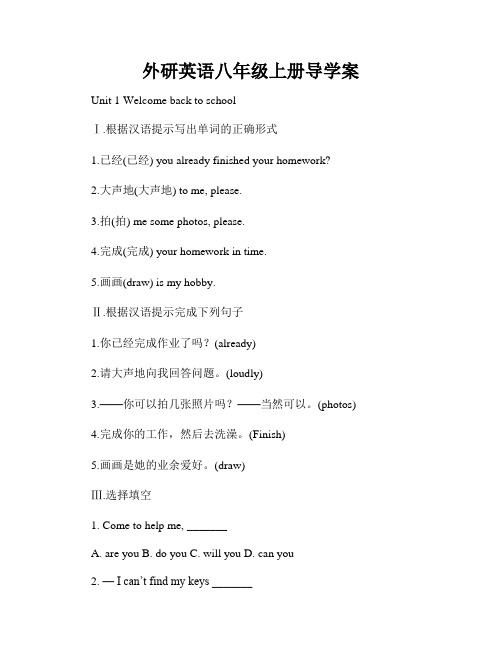
外研英语八年级上册导学案Unit 1 Welcome back to schoolⅠ.根据汉语提示写出单词的正确形式1.已经(已经) you already finished your homework?2.大声地(大声地) to me, please.3.拍(拍) me some photos, please.4.完成(完成) your homework in time.5.画画(draw) is my hobby.Ⅱ.根据汉语提示完成下列句子1.你已经完成作业了吗?(already)2.请大声地向我回答问题。
(loudly)3.——你可以拍几张照片吗?——当然可以。
(photos)4.完成你的工作,然后去洗澡。
(Finish)5.画画是她的业余爱好。
(draw)Ⅲ.选择填空1. Come to help me, _______A. are youB. do youC. will youD. can you2. —I can’t find my keys _______— When _______ you last see them?A. where, didB. that, haveC. that, didD. where, have3. Excuse me, can you help me _______ the road to the zoo?A. to findB. findsC. findD. found4. — Would you like to go to the movies with us this evening?—I’d love to, _______ I must prep are for my test tomorrow.A. orB. andC. butD. soⅣ.情景交际A: Excuse me, 1B: Certainly. Would you like to go there on foot?A: No, 2B: Well, you can take the No. 5 bus.A: How 3B: It’s about ten minutes’ ride.A: Thank you very much.1. A. can you help me find the way to the museum?2. A. I’d like to go there by bike.3. A. far is it from here to the museum?语言专项Ⅰ.选词填空A.根据句意及所给单词的首字母提示写出句中所缺单词1. Alice loves d________. She often reads the sports news in the newspaper.2. To keep health, we should have p________ exercise every day.3. The sun is s________ than the moon.4. The g________ are reading in the classroom.5. It’s very cold outside. Please close the w________.B.根据汉语提示完成下列句子6.—What’s the weather like today? — t________.7. — Why are you so tired? — I went to the party yesterday and I came back l________.8. Helen w________ to her friends on her way home yesterday.9. Do you like s________?10. We have fun s________ on the beach every Sunday.Ⅱ.句型转换1. Tom usually goes to work by bus. (变一般疑问句)— _______ Tom _______ to work by bus?2. They are at school now. (用just判断句子改写)— They _______ _______ at school.3. I will go to the bookstore after school. (对划线部分提问)— _______ _______ you _______ to go to the bookstore?4. It’s over there. (同义句)—It’s _______ your right.5. Helen played volleyball with her classmates after school yesterday. (对划线部分提问)— _______ _______ Helen play volleyball with after school yesterday?Ⅲ.连词成句1. is, book, the, who, looking, for, my2. to, wear, you, should, in, summer, sunglasses, the, sun3. back, my, and, room, turn, then, it, clean, the4. do, you, what, school, in, often, the, do5. then, practice, let’s, the, speaking, dialoguesⅣ.文化知识Language is very important in our daily life. It helps us to u and communicate with others. There are about 6,000 languages spoken in the world. English is one of the most important languages in the world. It is spoken by people all over the world. People in different countries speak English when they meet each other. Most countries use English as a secondlanguage. English is also used as a kind of working language. When people from different countries do business together, they often use English to communicate with each other. So learning English well is very important. It can help us know more about the world.。
八年级上册英语导学案
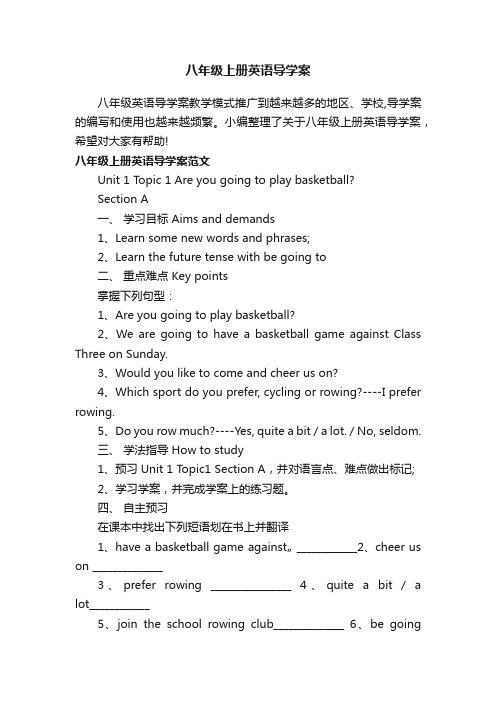
八年级上册英语导学案八年级英语导学案教学模式推广到越来越多的地区、学校,导学案的编写和使用也越来越频繁。
小编整理了关于八年级上册英语导学案,希望对大家有帮助!八年级上册英语导学案范文Unit 1 Topic 1 Are you going to play basketball?Section A一、学习目标 Aims and demands1、Learn some new words and phrases;2、Learn the future tense with be going to二、重点难点 Key points掌握下列句型:1、Are you going to play basketball?2、We are going to have a basketball game against Class Three on Sunday.3、Would you like to come and cheer us on?4、Which sport do you prefer, cycling or rowing?----I prefer rowing.5、Do you row much?----Yes, quite a bit / a lot. / No, seldom.三、学法指导 How to study1、预习Unit 1 Topic1 Section A,并对语言点、难点做出标记;2、学习学案,并完成学案上的练习题。
四、自主预习在课本中找出下列短语划在书上并翻译1、have a basketball game against… ____________2、cheer us on ______________3、prefer rowing ________________4、quite a bit / a lot____________5、join the school rowing club______________6、be goingto…______________五、知识链接 Hot links1、【课文原句】Are you going to play basketball?译文________________________________________________. 【分析点拨】be going to的用法⑴ be going to是一种固定结构,后面要接动词原形,用来表示按计划或安排要发生的动作,有时也可以表示推测将要或肯定会发生的动作,有―准备;打算‖的意思。
八年级上册英语全册导学案(人教版)
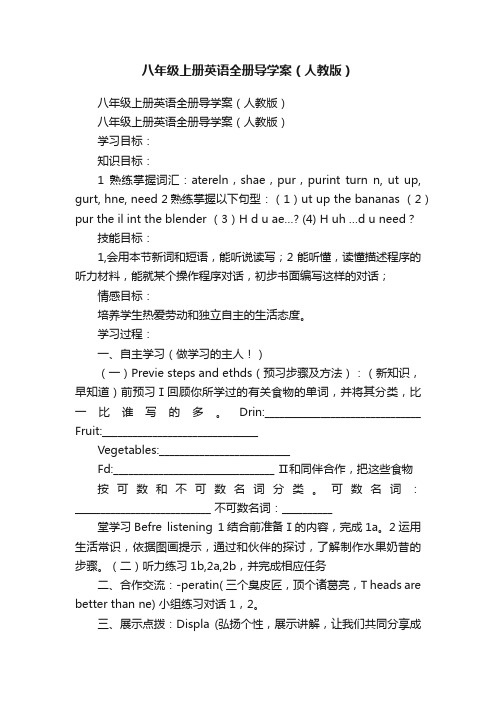
八年级上册英语全册导学案(人教版)八年级上册英语全册导学案(人教版)八年级上册英语全册导学案(人教版)学习目标:知识目标:1熟练掌握词汇:atereln,shae,pur,purint turn n, ut up, gurt, hne, need 2熟练掌握以下句型:(1)ut up the bananas (2)pur the il int the blender (3)H d u ae…? (4) H uh …d u need?技能目标:1,会用本节新词和短语,能听说读写;2能听懂,读懂描述程序的听力材料,能就某个操作程序对话,初步书面编写这样的对话;情感目标:培养学生热爱劳动和独立自主的生活态度。
学习过程:一、自主学习(做学习的主人!)(一)Previe steps and ethds(预习步骤及方法):(新知识,早知道)前预习Ⅰ回顾你所学过的有关食物的单词,并将其分类,比一比谁写的多。
Drin:_______________________________ Fruit:_______________________________Vegetables:__________________________Fd:________________________________ Ⅱ和同伴合作,把这些食物按可数和不可数名词分类。
可数名词:___________________________ 不可数名词:__________堂学习Befre listening 1结合前准备Ⅰ的内容,完成1a。
2运用生活常识,依据图画提示,通过和伙伴的探讨,了解制作水果奶昔的步骤。
(二)听力练习1b,2a,2b,并完成相应任务二、合作交流:-peratin( 三个臭皮匠,顶个诸葛亮,T heads are better than ne) 小组练习对话1,2。
三、展示点拨:Displa (弘扬个性,展示讲解,让我们共同分享成功的喜悦!)Rle pla the nversatins in 1 and 2 Sh t the lasses四、巩固提升:Exerise in lass (别低估了自己的潜力!)根据首字母提示补全单词,使句子完整通顺。
- 1、下载文档前请自行甄别文档内容的完整性,平台不提供额外的编辑、内容补充、找答案等附加服务。
- 2、"仅部分预览"的文档,不可在线预览部分如存在完整性等问题,可反馈申请退款(可完整预览的文档不适用该条件!)。
- 3、如文档侵犯您的权益,请联系客服反馈,我们会尽快为您处理(人工客服工作时间:9:00-18:30)。
编号:№1 班级小组姓名小组评价教师评价Unit 1 How often do you exercise?第1课时(总第1课时)Teacher's words : Practice makes perfect.【Learning objectives】Knowing :本课的11个单词与9短语Habit----forming: ① A: What do you usually do on weekends?B: I often go to the movies.② A: How often do you watch TV? B: Twice a week Practising:熟练运用本课词汇及句型谈论活动及其发生的频率。
.【Important points】频率词汇及询问活动频率【Difficult points】一般现在时态的熟练运用【Learning process】一、自主学习Task 1.学习1a-1c:谈论日常行为活动1、看图画,写出活动词汇a __________________b __________________ c___________________d __________________e go skateboarding2、了解下列频率副词,写出其汉意always (100%) usually(80%) often(30-50%)sometimes (20%) hardly ever(5%) never(0%)听听力,与1中的活动完成搭配。
(只写1中的字母代号)always_____usually _____often____ sometimes ____ hardly ever_____ never ___3、两人一组,利用短语;仿照下列句型谈论日常活动。
(注意;第三人称替换)A: What do you usually do on weekends? B: I often go to the movies.A: What does he usually do on weekends? B: He often goes skateboarding. Task 2.学习2a-2c:学习频率副词,利用How often.........?句型谈论活动频率。
活动设计: 1、写出下列频率副词总是_____ 通常________ 经常______ 有时________ 几乎不______ 从不______2、写出下列表示频率的副词短语每天:一周一次:一周两次:一周三次:一月一次:一月两次3、首先个人迅速理解下列词汇,然后听录音,给活动词汇排序。
再听完成搭配(只写字母) Activities How oftena. ________ go to the movies every dayb. watch TV once a weekc. _______ _ shop twice a weekd._________exercise three times a weeke. read once a month4、理解下列询问频率的句型,并仿照练习(注意:第三人称替换)A: How often do you watch TV? B: Twice a week.5、读2c对话,理解并仿照练习网上冲浪 :surf the Internet二、合作共建1、你知道频率副词的位置在哪儿吗?将下列词组成句子。
(1) is late always he for school .______________________________________. (2) homework Gina school does often at _____________________________.2、区别下列有关how的短语how many _______ how much ______ how often ____how old ________ how long_____三、系统总结1、写出本课的频率副词:2、本课的两个重点句型:(1)(2)四、诊断评价1、翻译下列短语(1)多久___________(2)去踩滑冰_____________ (3)几乎从来不____________(4)网上冲浪_____________(5)一周一次 _____________(6)一月两次 _______(7)一周三次_______________(8)在周末 ______________2、单项选择(1)-_____ do you do your homework? --- Every day.A.WhenB. How oftenC. How many timesD. What time(2) I visit my grandparents _________a month.A. two timesB. second timeC. the second timeD. twice(3)One of my favorite programs ________ Animal World.A. amB. isC.areD. don't(4)She hardly ever ________ sports games _____ TV on Sunday evening..A. watching ; overB. to watch; inC. watch; byD. watches , on3、用下列词填空(surf , program , once , result , health )(1) My grandma is pretty _____ because she exercises every day.(2) ---What's your favorite TV_______? --- It's CCTV news(3) Here are the ______ of the students' activity at Hilltop School.(4) He hardly ever ______ the Internet.(5) ______ a year,they have a Christmas Party.五、课后反思编号:№2 班级小组姓名小组评价教师评价Unit 1 How often do you exercise?第2课时(总第2课时)【Learning objectives】Knowing :本课的8个单词与短语Practising:熟练运用频率副词【Important points】能运用本课词汇及句型进行自由交际对话.【Difficult points】一般现在时态的熟练运用【Learning process】一、自主学习Task 1. 会读写本课单词及短语(1)个人记读单词3分钟(2)两人一组相互检查读音(3)展示,写在学案上单词:大多数的;大部分的;几乎全部的结果;成果活跃的;积极的对于;关于约摸;大约短语:每天一周一到二次一周三到四次在格林高中至于;关于大多数学生一些学生Task 2.学习3部分1、利用所给数据填all、 most 、some、或 noall=100% most=51%--99% some=1%--50% no= 0%(2)a.Here are the results of the student activity survey at Green High School.该句为倒装句,其主语为the results of the student activity survey."Here+be+主语"是英语中常见的倒装句型。
例如:高小姐,送给你一些鲜花。
b.As for homework至于家庭作业:as for意为“至于,就……而言”,后接名词或代词构成介词短语,置于句首,作状语。
例如:至于牛奶,我很喜欢。
c.The results for "watch TV"are interesting.“看电视”的结果很有趣。
介词短语 for "watch TV"作后置定语,修饰the results.介词 for此处表示作用、用途,意为“供,适合于”。
例如:我没有钱打车,所以我步行回家了。
(3)复述课文Task 3.学习4部分在小组内展开调查,完成表格,并根据调查结果写一篇作文所需语言结构 A:How often do you read Englishbooks?B: I read English books about twice a week二、合作共建all, most ,some, no这四个词的区别三、系统总结请你写出所学的表频率的副词(至少写10个)及表多少的词四、诊断评价1、选择1) The twins' uncle every day.A、exerciseB、exercisesC、is exerciseD、is exercises2) do you go to the movies?A、How mangB、How oftenC、How muchD、How3) I think I am . A、Health B、not health C、healthy D、healthest4) My mother wants me . A、drink B、not drink C、drinks D、to drink5) Jim is a good student. He late for class.A、is hardly everB、is not everC、is everD、is always6) There a lot of junk food on the table. A、are B、have C、is D、has7) homework , we do it on Sunday.A、As forB、As toC、As ofD、As from8) How often do you play soccer .A、two time a weekB、twice a weekC、a time a weekD、one time a week2、补全句子1)我每周购物一两次。
I shop a week.2)“看电视”的调查结果很有趣。
The "watch TV" arevery .3)对于家庭作业,大多数学生每天都做。
homework, students do every day.五、整理学案及背诵编号:№3 班级小组姓名小组评价教师评价Unit 1 How often do you exercise?第3课时(总第3课时)【Learning objectives】Knowing :本课的9个单词与短语Practising: 1、正确运用How often 引导的疑问句进行交际。
